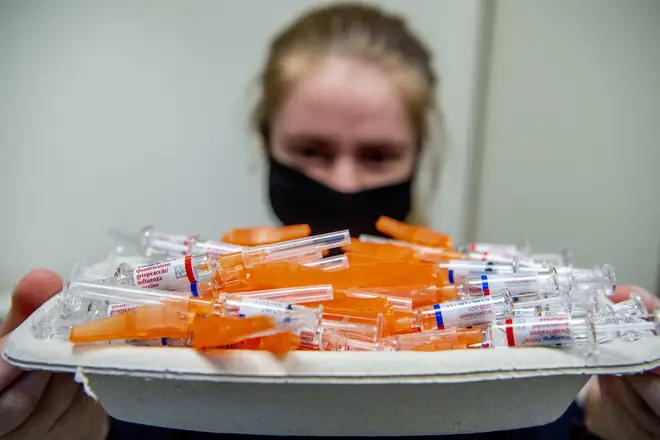
Nick Ferrari 7am - 10am
28 October 2020, 12:59 | Updated: 28 October 2020, 13:08

The delivery of potential Covid-19 vaccines to European Union countries could begin as early as April, the head of the European Commission has revealed.
Ursula von der Leyen told a news conference on Wednesday that “big numbers of supplies are due to start in April,” adding that in the best-case scenario companies could deliver up to 50 million vaccines a month to the EU.
But she cautioned: “The vaccine is not the miraculous event that changes all from one day to the next,” adding this year’s Christmas “will be different” and “a lot depends on our behaviour” over the coming weeks.
The European Commission is proposing a series of new measures to fight the pandemic in the EU, saying the new spike in infections on the continent is “alarming”.
The #COVID19 situation is very serious. But we can slow down the spread of the virus if everyone takes responsibility. We have learnt from the 1st wave. Today we’re stepping up our common response.https://t.co/xAFxBWxEMk
— Ursula von der Leyen (@vonderleyen) October 28, 2020
France is poised to announce a second national lockdown as early as this evening, while Belgium is also looking at tougher restrictions as coronavirus cases soar across the Continent.
Stricter curbs are also being introduced in Germany, Italy and Spain, with the UK Prime Minister under growing pressure to follow suit.
There is no clinically proven vaccine against the coronavirus, though nearly 200 candidates are in development worldwide, with 44 in clinical trials. Late-stage trial results are expected for the first of them by the end of 2020.

"We have a huge problem with claims that scientists are exaggerating"
The latest vaccine hope came as the head of the UK Vaccines Task Force, Kate Bingham, said there was a possibility that a vaccine rollout will commence before Christmas.
But writing in The Lancet medical journal, she warned any vaccine is “is likely to be imperfect” and “might not work for everyone”.
”We do not know that we will ever have a vaccine at all,“ she wrote. ”It is important to guard against complacency and over-optimism.
“The first generation of vaccines is likely to be imperfect, and we should be prepared that they might not prevent infection but rather reduce symptoms, and, even then, might not work for everyone or for long.”
The vaccine taskforce was created by Sir Patrick Vallance, the UK government's chief scientific advisor, in May. Ms Bingham reports directly to Boris Johnson.

""We have two strong candidates for the vaccine," taskforce medic says
Britain has agreed supply deals for six candidates including frontrunners from AstraZeneca, in partnership with the University of Oxford, and Pfizer.
In a separate review published in The Lancet Infectious Diseases journal, researchers from the University of Oxford said a meaningful comparison of different candidates would be required to ensure only the most effective vaccines are deployed.
Dr Susanne Hodgson, of the University of Oxford, wrote: “It is unlikely that we will see a single vaccine winner in the race against Covid-19.
“Different technologies will bring distinct advantages that are relevant in different situations, and additionally, there will probably be challenges with manufacturing and supplying a single vaccine at the scale required, at least initially.
“Taking a standardised approach to measuring the success of vaccines in clinical trials will be important for making meaningful comparisons, so that the most effective candidates can be taken forward for wider use.”